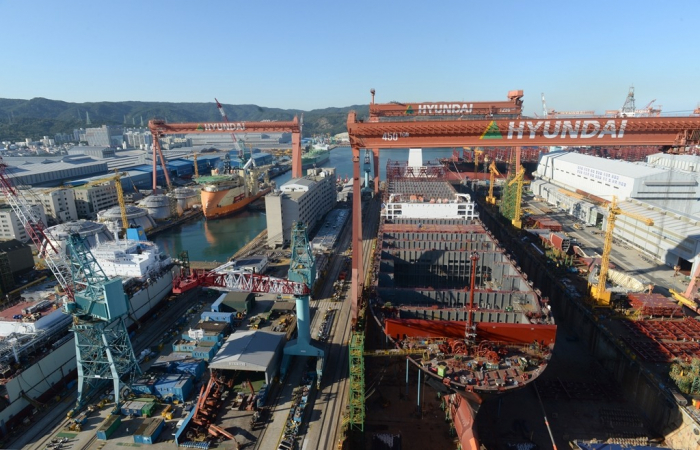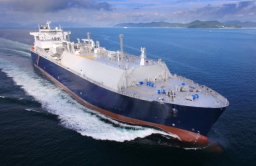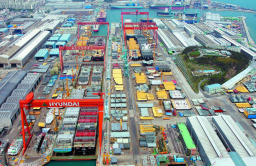-
KOSPI 2812.05 +41.21 +1.49%
-
KOSDAQ 756.23 +6.02 +0.80%
-
KOSPI200 376.54 +6.64 +1.80%
-
USD/KRW 1373 3.00 -0.22%
Korean shipyards to benefit from record LNG carrier prices
Shipping & Shipbuilding
Korean shipyards to benefit from record LNG carrier prices
S.Korean shipbuilders bag fewer orders than their Chinese rivals in April as they focus on high-value, eco-friendly vessels
By
May 09, 2023 (Gmt+09:00)
2
Min read
News+

South Korean shipbuilders are expected to benefit from record liquefied natural gas (LNG) carrier prices while bagging more orders for new vessels despite the global industry downturn in April.
The average price of new liquefied natural gas carriers with a capacity of 174,000 tons jumped 14.3% to an all-time high of $256 million last month from a year earlier, according to industry tracker Clarksons Research on Monday.
The average values of new large crude oil tankers with capacities of 315,000-320,000 tons grew 5.1% to $122 million, while the average price of new container ships, which can carry 22,000-24,000 twenty-foot equivalent units, rose 6.9% to $217.5 million, the data showed.
Such increases helped the Clarksons Newbuilding Price Index, a gauge of price changes in newly built ships, rise 6% to 167.32, its highest point since December 2008.
Higher values of new vessels, especially LNG carriers, pushed up prices of South Korean shipbuilders’ stocks.
HD Hyundai Heavy Industries Co. surged 4%, while Daewoo Shipbuilding & Marine Engineering Co. and Samsung Heavy Industries advanced 4.5% and 3.3%, respectively, on Tuesday in the South Korean main stock market. The Kospi eased 0.1%.
HIGH-VALUE, ECO-FRIENDLY VESSELS
South Korean shipbuilders have been concentrating on deals for high-value and eco-friendly vessels for new orders.
Last month, Samsung inked a 674.5 billion won ($509 million) deal for two LNG carriers, while Daewoo secured a 339.6 billion won contract for one vessel to carry the fuel, according to their filings to a local financial regulator. Earlier this month, HD Hyundai Heavy bagged two orders worth a total of 2.2 trillion won to manufacture six LNG carriers.
South Korean shipbuilders clinched a combined 380,000 compensated gross tons (CGTs) in new orders last month, up 15% from a year earlier, although total global new orders tumbled 62% to 1.9 million CGTs, according to Clarksons Research. Local dockyards’ order backlogs totaled 38.5 million CGTs.
Meanwhile, their Chinese rivals bagged 1.4 million CGTs in new orders during April, up 5% on-year.
“Shipping companies that urgently need new vessels are rushing to Chinese shipbuilders as Korean dockyards are selective in signing new orders,” said an industry source in Seoul.
Write to Hyung-Kyu Kim at khk@hankyung.com
Jongwoo Cheon edited this article.
More To Read
-
 Shipping & ShipbuildingSamsung Heavy wins order $512 mn for two LNG carriers
Shipping & ShipbuildingSamsung Heavy wins order $512 mn for two LNG carriersApr 03, 2023 (Gmt+09:00)
-
 Shipping & ShipbuildingKorean shipbuilders turn focus to high-value vessels
Shipping & ShipbuildingKorean shipbuilders turn focus to high-value vesselsOct 14, 2021 (Gmt+09:00)


